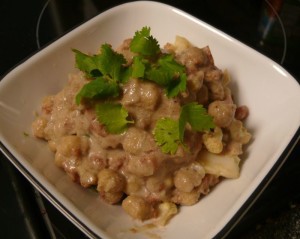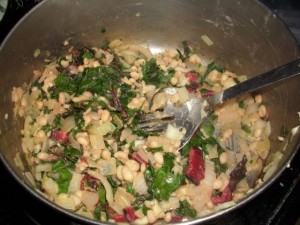Happy Celiac Disease Awareness Month! It’s rather stunning to think of how the gluten-free world has changed in the past decade, and how much easier some things have gotten. We’ve got mainstream cereals, brownies, cookbooks, bakeries… There’s a lot to celebrate. While there are many people who are gluten-free without really quite knowing why or what that means, but there’s also a huge amount of scientific advances and community awareness.
Taking a look back, here are my 3 favorite articles that I’ve written on Celiac and a gluten-free lifestyle:
- 9 Celiac myths that need to be retired for good
- The Celiac & Thyroid Disease link
- The Gluten-Free Vitamin Guide

A gluten-free vegetarian:
The health benefits from reducing the amount of meat in the diets of most Americans are, by now, well established. Over 14 million Americans are vegetarian, and the lifestyle has appeal based on ethical, monetary, religious and/or environmental reasons too. Fortunately, with extra planning, a well-rounded and delicious gluten-free vegetarian diet is totally doable.
Studies have shown that the overwhelming majority of people newly diagnosed with Celiac have vitamin deficiencies—it’s a whopping 87% in a 2013 study. It also seems like the majority of g-free peeps eat fewer nutrients and don’t get enough iron, calcium, vitamin D, fiber and B vitamins (including B12). Pair that with a vegetarian or vegan diet — which can be lacking in calcium, B12, omega fats, zinc and vitamin D, and sometimes iron and protein — and it’s easy to miss out on necessary nutrients.
Quite frankly, it’s also more challenging to juggle the constraints of eating strictly gluten-free and vegetarian or vegan. I’ve had the pleasure to know many inventive cooks who cook up grand concoctions, but it certainly requires great care, especially when out to eat.
Sneaky traps for gluten-free vegetarians:
Okay, so you already look out for the breaded tofu and the veggies marinated with soy sauce. Here are others that can be tricky, especially for vegetarians:
- Seitan—they call it “wheat meat” for a reason
- Falafel!—yes, it’s made of chickpeas, but wheat flour is often added to thicken and make it stick toge
 ther.
ther. - Tofurkey—yep, this soybean beast harbors some sneaky gluten
- Tempeh—it’s fermented from soybeans, but can contain wheat, too.
- Miso—did you know this can contain barley? Barley may not be labeled clearly, either.
- Most of the meatless burgers (Boca, etc.) are made of wheat protein.
- Textured vegetable protein (TVP) can be wheat-based. Check the label.
- Any “wheat meat!”
Also, check out an article I authored for Today’s Dietitian “A Gluten Free Vegetarian” that covers the basics of combining both diets.
G-Free Vegetarian Webinar for Nutrition pros:
I’m doing a 1.5 CEU webinar on a Gluten-Free Vegetarian Diet on May 21st at 3pm EST. Love to “see” you there!
Yogurt eaters, beware:
I just saw this post from Gluten-Free Watchdog regarding a few of the Stonyfield farm brand yogurts. They use oats that are not certified gluten-free, although the final product is tested. IMHO, that’s an unnecessarily risky choice.
Harris Whole Health offers individual sessions, family sessions and group classes to help people eat healthier and feel better! Whether you are dealing with a specific health concern, or if you just want to feel and look better, Cheryl can help you achieve your goals. For an appointment with Cheryl Harris, Registered Dietitian and Nutritionist, please click here or call 571-271-8742.
